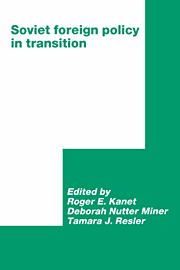Book contents
- Frontmatter
- Contents
- List of tables
- List of contributors
- Preface
- Introduction
- Part I The Soviet Union and the international political system
- Part II The Soviet Union and Europe
- Part III The Soviet Union and the developing world: global trends
- 6 From new thinking to the fragmentation of consensus in Soviet foreign policy: the USSR and the developing world
- 7 Soviet new thinking on national liberation movements: continuity and change
- Part IV The Soviet Union and the developing world: regional and country case studies
- Part V Conclusion
- Index
6 - From new thinking to the fragmentation of consensus in Soviet foreign policy: the USSR and the developing world
Published online by Cambridge University Press: 05 February 2012
- Frontmatter
- Contents
- List of tables
- List of contributors
- Preface
- Introduction
- Part I The Soviet Union and the international political system
- Part II The Soviet Union and Europe
- Part III The Soviet Union and the developing world: global trends
- 6 From new thinking to the fragmentation of consensus in Soviet foreign policy: the USSR and the developing world
- 7 Soviet new thinking on national liberation movements: continuity and change
- Part IV The Soviet Union and the developing world: regional and country case studies
- Part V Conclusion
- Index
Summary
In the spring of 1985, when Mikhail S. Gorbachev assumed the leadership of the Communist Party of the Soviet Union, relations with developing countries were still at the center of Soviet foreign policy. Despite growing evidence of a reconsideration of this emphasis among Soviet analysts, the USSR remained deeply involved in regional conflicts across the entire spectrum of the Third World – from Cambodia and Afghanistan in Asia to the Horn and Angola in Africa and Nicaragua and El Salvador in Central America. Western analysts asserted that the role of the Soviet Union as a global power was based almost exclusively on its military capabilities, including both command over ever more sophisticated nuclear and conventional armaments and expanding military involvement in Third World regional conflicts. Moreover, in their view, the military stalemate in US–Soviet relations had deflected Soviet superpower aspirations toward the Third World.
After 1985 the Soviet Union underwent revolutionary changes in both its domestic and its foreign policy. In the foreign policy area the initial focus of these changes emphasized the reduction of conflict with the West, especially the United States, as an essential element of the overall reform of Soviet society. The result was a series of agreements on arms limitations and a dramatic improvement in the international political atmosphere. In addition, developments in the Soviet–East European relationship throughout 1989 and 1990 were of historic importance and resulted in the collapse of Soviet-imposed Marxist–Leninist regimes in East-Central Europe and the emergence of independent states, as well as structural changes in the entire political-security balance in Europe.
- Type
- Chapter
- Information
- Soviet Foreign Policy in Transition , pp. 121 - 144Publisher: Cambridge University PressPrint publication year: 1992
- 2
- Cited by



